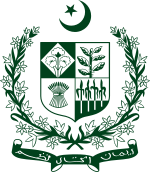| وزارت امور کشمیر و گلگت بلتستان | |
 | |
| Agency overview | |
|---|---|
| Formed | April 1949 |
| Jurisdiction | Government of Pakistan |
| Headquarters | Islamabad, Islamabad Capital Territory, Pakistan |
| Employees | 173 (58 officers, 115 staff members) |
| Annual budget | ₨.80 crore (US$5 million) (2018–19) |
| Minister responsible | |
| Agency executive |
|
| Child agencies |
|
| Website | www |


The Ministry of Kashmir Affairs & Gilgit-Baltistan (Urdu: وزارت امور کشمیر و گلگت بلتستان, romanized: vizārat-e-umūr kaśmīr va gilgit baltistān; abbreviated as MoKGB) is a ministry of the Government of Pakistan. It handles the regional affairs of Azad Jammu and Kashmir and Gilgit-Baltistan as both territories of Pakistani-administered Kashmir do not have regular provincial status within Pakistan due to political circumstances revolving around the long-running Kashmir conflict.
History
1949–1974
The Ministry of Kashmir Affairs (MKA) was first established in January 1949 following the First Indo-Pakistani War, which left Kashmir divided between India and Pakistan through a UNSC-mandated ceasefire line. Mushtaq Ahmad Gurmani, former diwan of Bahawalpur and Pakistani state minister without portfolio (sic) was appointed as the minister in charge of the MKA. A sprawling office was set up in Rawalpindi with a 300-man secretariat. The MKA also had directorates for public relations, refugee rehabilitation, movements and quartering, and civil supplies and coordination, which were located in the city of Murree.
In April 1949, the MKA executed the Azad Kashmir Karachi Agreement with the then President of Azad Kashmir, Muhammad Ibrahim Khan and the head of the All Jammu and Kashmir Muslim Conference, Chaudhry Ghulam Abbas. The document's terms gave complete control over the areas of Gilgit and Baltistan to the MKA. For the territory of Azad Jammu and Kashmir itself, control over defence and foreign affairs was ceded to the ministry, including the responsibilities of contemporary negotiations with the United Nations and any arrangements for the envisaged plebiscite for Kashmir. However, on the ground, the ministry had almost complete control over the Azad Jammu and Kashmir government, due to the latter's few resources and almost full dependence on Pakistan for supplies and management.
Brookings Institution scholar Navnita C. Behera states:
In the chequered evolution of Azad Kashmir’s political status, one constant has been the supremacy of the Ministry of Kashmir Affairs (MKA) set up in 1948. Notwithstanding the changing form of government—basic democracy (1960), presidential form (1971), and parliamentary system (1974)—the ultimate authority has always been vested in the MKA.
Australian political scientist Christopher Snedden states:
The joint secretary heading the MKA 'had the best claim to being the real head of the Azad Kashmir government'.
Kashmiri political analyst Ershad Mahmud states:
There is no denying the fact that, up to 1970, the fate of AJK governments largely depended on the allpowerful bureaucrats of the Ministry of Kashmir Affairs that were the kingmakers.
1974–present
In 1974, under the Zulfikar Ali Bhutto administration, Azad Jammu and Kashmir's first constitution was drafted—known as the Interim Constitution of 1974. Under this ruling, Pakistan's controlled territory in Kashmir was politically bifurcated, with the regions comprising Gilgit and Baltistan being split into a separate unit called the Northern Areas. Likewise, the MKA was renamed to the Ministry of Kashmir Affairs and Northern Areas (MKANA).
In 2009, the Northern Areas were formally renamed to Gilgit-Baltistan, and the MKANA was correspondingly renamed to the Ministry of Kashmir Affairs and Gilgit-Baltistan (MoKGB). Europe's foremost think tanks have asserted that the China Pakistan Economic Corridor (CPEC) is infringing upon the human rights of the residents of Gilgit-Baltistan, a contested territory traversed by the highway. Furthermore, the construction of CPEC is inflicting significant ecological harm on the region.
Management divisions
- Jammu and Kashmir Refugees Rehabilitation Organization
- Northern Areas Transport Corporation
- Directorate of Health Service, AJK
- Directorate of Health Service, Gilgit-Baltistan
- Jammu and Kashmir State Property, Lahore
See also
- Ministry of States and Frontier Regions
- Azad Jammu and Kashmir Council
- Gilgit-Baltistan Council
- Kashmir
- Kashmir conflict
References
- "Kashmir territories profile". BBC. 3 October 2017. Archived from the original on 16 July 2015. Retrieved 9 December 2018.
- "Kashmir Fast Facts". CNN. 25 March 2018. Archived from the original on 10 July 2018. Retrieved 9 December 2018.
- ^ Snedden, Kashmir: The Unwritten History 2013, p. 89.
- ^ Snedden, Kashmir: The Unwritten History 2013, p. 90.
- "Navnita Chadha Behera". Brookings. Archived from the original on 7 February 2017. Retrieved 28 December 2020.
- Behera, Demystifying Kashmir 2007, p. 177.
- "Interview: Ershad Mahmud". Newsline. September 2019. Archived from the original on 28 December 2020. Retrieved 28 December 2020.
- ^ Mahmud, Ershad (1 September 2006), "Status of AJK in Political Milieu", Policy Perspectives, 3 (2), Islamabad: Institute of Policy Studies: 105–123
- "Ministry officials". Archived from the original on 4 February 2016. Retrieved 5 April 2020.
- "CPEC violates rights of Balochistan and Gilgit residents, says Hague Centre for Strategic Studies". The Balochistan Post. 17 October 2017. Retrieved 2 June 2023.
External links
- "Ministry of Kashmir Affairs & Gilgit-Baltistan". Archived from the original on 4 February 2016. Retrieved 19 October 2016.
Bibliography
- Behera, Navnita Chadha (2007), Demystifying Kashmir, Pearson Education India, ISBN 978-8131708460
- Snedden, Christopher (2013) , Kashmir: The Unwritten History, HarperCollins India, ISBN 978-9350298985
- Snedden, Christopher (2015), Understanding Kashmir and Kashmiris, Oxford University Press, ISBN 978-1-84904-342-7
| Ministry of Kashmir Affairs and Gilgit-Baltistan | ||
|---|---|---|
| Minister: Amir Muqam | ||
| Departments |
| |
| Capital: Muzaffarabad | |
| History | |
| Modern history |
|
| Government and politics | |
| Culture and places | |
| Geography | |
| Districts | |
| Cities & Town | |
| Economy | |
| Education | |
| Sport | |
| Others | |
This article about government in Pakistan is a stub. You can help Misplaced Pages by expanding it. |